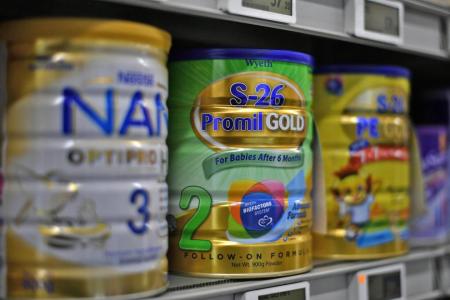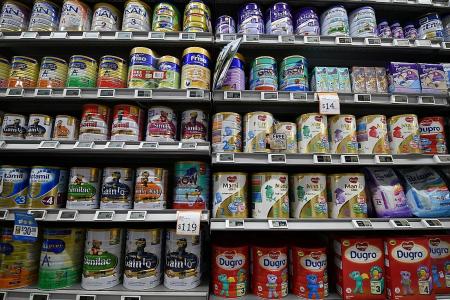CCS: 95% of buyers go for premium powder
Spike in infant formula milk prices sparked by demand, says Competition Commission
Only 5 per cent of Singaporeans who bought milk powder in 2015 opted for standard brands over premium or speciality ones, the Competition Commission of Singapore (CCS) said yesterday.
This willingness to pay for premium brands has empowered manufacturers to push up wholesale prices - on top of other costs such as research and development, and rising overheads - leading to the 120 per cent increase in average prices over the last decade.
Milk powder prices in Singapore were also found to be higher than in many other countries, including Australia, Japan and the UK, said the CCS.
On Monday, Senior Minister of State for Trade and Industry Koh Poh Koon told Parliament that import requirements for infant milk powder will be reviewed to make more options available in stores.
The Straits Times reported in March that the average price of a 900g tin had gone up 120 per cent over the last decade to $56.06, outstripping increases for other household staples.
Yesterday, the CCS released a report on its market inquiry into the supply of formula milk from 2015 till last December.
It found that top considerations when buying milk powder was brand name along with safety and nutrition.
Insufficient understanding of the nutritional content of formula milk and the dietary requirements of infants and young children have often led parents to perceive that the more expensive or premium products are of higher quality.” Competition Commission of Singapore
"Insufficient understanding of the nutritional content of formula milk and the dietary requirements of infants and young children have often led parents to perceive that the more expensive or premium products are of higher quality," said the report.
But all products, even those that cost half the price of premium brands, sold here are required to meet the safety and nutritional requirements set by the Agri-Food and Veterinary Authority of Singapore (AVA).
The CCS also found most parents tend to stick with the brand their babies were exposed to in hospitals - which are sponsored by manufacturers that try to give their premium brands "first-mover advantage".
Manufacturers also advertised their premium brands more aggressively, with marketing expenditure by all major manufacturers rising by 42.4 per cent from 2010 to 2014, said CCS.
To educate parents on such products, the AVA said in a media release that it will tighten regulations on labelling and advertising, and prohibit health claims and idealised images.
This will also discourage companies from spending massively on advertising and marketing activities and passing on the costs to consumers in the form of higher prices, it added.
The Health Promotion Board will extend restrictions on the advertising, marketing and promotion of infant formula for babies from below six months to up to 12 months of age.
The AVA will also streamline procedures for suppliers and brands to enter Singapore while maintaining the safety and nutrition standard requirements.
A NTUC FairPrice spokesman told The New Paper that it is discussing with the authorities how to expand its sourcing options and provide better value products to parents.
Singapore Management University associate professor of marketing Hannah Chang told TNP that the price spike was caused by strong consumer demand for premium brands.
While the measures are a step towards encouraging consumers to make more educated decisions it would take time to break the cycle, she said.
CIMB economist Song Seng Wun said: "There's no exploitation by companies. Singaporeans generally want the best and are willing to pay more when it comes to their children.
"We see the case for tuition centres as well. This is our culture, something bigger than milk powder."
Ms Dahlia Wati, 36, a boutique owner with a nine-month-old son, said many factors influence parents to choose premium brands.
"I would choose a cheaper alternative, but my son is used to the taste of the S26 milk powder I'm using now," she said.
Private hospitals paid to keep milk on rotation
It is not just advertising that gets premium milk powder brands entrenched in the minds of Singaporeans.
Manufacturers also provide payments, sponsorship, or both, to private hospitals for participation in their milk rotation systems - allowing them to gain a "first-mover advantage" when it comes to exposing parents to the brand, said the Competition Commission of Singapore (CCS) in its market inquiry report released yesterday.
It said: "Hospitals are one of the first avenues where parents come into contact with formula milk...
"Given that majority of parents... do not have a preferred brand and tend not to switch brands... after leaving the hospital, manufacturers have invested significant efforts and resources into the marketing activities in the hospital channel."
The level and quality of support provided by the formula milk manufacturers can affect how long their brand is used by the hospitals, said the CCS.
Some formula milk manufacturers make monetary contributions to private hospitals for participation in the milk rotation system. These could be in the form of monetary sponsorship for events.
All six major brands in Singapore took part in the milk rotation system of the private hospitals that CCS engaged, said the report.
But public hospitals that offer maternity services - KK Women's and Children's Hospital (KKH), National University Hospital and Singapore General Hospital - are prohibited from entering into such arrangements.
They have a rotation system that ensures an equal duration for different manufacturers.
Singapore Management University associate professor of marketing Hannah Chang said this strategy would get brands known to parents.
"Rather than err on the side of caution, consumers go for well-known brands they are familiar with.
"Hospitals are perceived as trusted experts in the domain, hence mothers tend to stick to the brands that hospitals use," she said.
REVIEW ON SPONSORSHIPS
The CCS recommended a review on the sponsorships and payments that formula milk manufacturers provide, and their impact on the milk rotation programmes in the hospitals.
The Ministry of Health said in a media release that it accepted the recommendation and will work with industry players to make available more affordable infant formula brands for use in hospitals.
Dr Chua Mei Chien, KKH's head and senior consultant of the department of neonatology, said: "We welcome the latest announcement from the Ministry of Health about making available more affordable infant formula milk in the ready-to-feed form suitable for use in the hospital, as it will encourage more infant formula companies to participate in our hospital's milk rotation programme."
Get The New Paper on your phone with the free TNP app. Download from the Apple App Store or Google Play Store now




